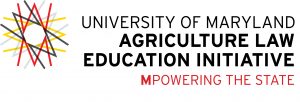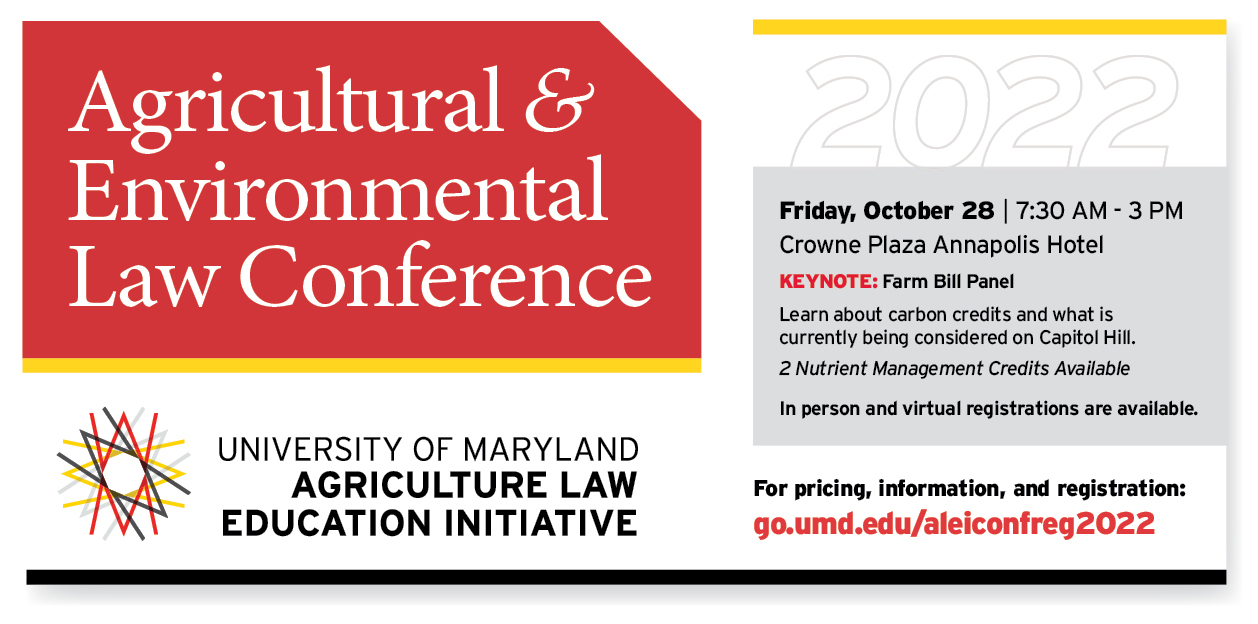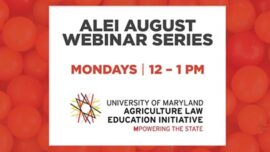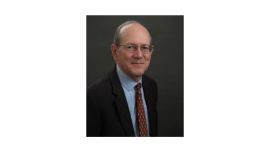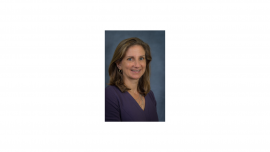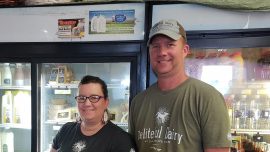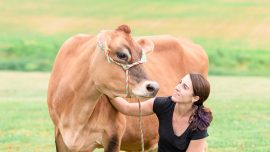August 2022 Update
2022 Annual Agricultural and Environmental Law Conference
ALEI Hosts Russell Brinsfield Interns
2022 Annual Agricultural and Environmental Law Conference
By: ALEI Team
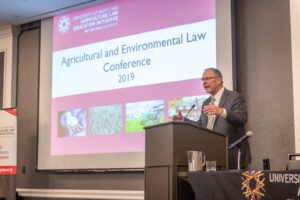
Do you have trouble keeping up to date with agricultural and environmental laws? The Agricultural and Environmental Law Conference (AELC), hosted by the Agriculture Law Education Initiative (ALEI), is a unique event that brings together stakeholders from Maryland’s agricultural, conservation, and legal fields. Whether you are curious about the upcoming Farm Bill or want to learn more about the growth of the hemp industry, ALEI is bringing together the experts to discuss these topics and more at this year’s conference. The conference will be held on October 28th from 8AM-3PM at the Crowne Plaza Hotel in Annapolis, MD and both in-person and livestream attendance options are available. Continuing nutrient management education credit is available and registration is free for students!
Show More The AELC is an opportunity for networking, educational growth, and discussing the intricacies of environmental law and agriculture. The conference will begin with a look at how Maryland’s new Partition of Property Act helps families with complex title issues preserve their families’ real property so that it can be passed to the next generation. The law impacts both urban and rural families, and helps owners of heirs’ property better protect and manage the land they own. The next panel will feature scientific and policy experts to discuss the growth of the hemp industry. The last two Farm Bills have opened the door for hemp production in the U.S. However, this relatively new industry is still evolving and this discussion will center around what we have learned and what still needs to be done to foster hemp production. This work is supported by the Agriculture and Food Research Initiative (AFRI) program from the U.S. Department of Agriculture, National Institute of Food and Agriculture. Another of the morning panels will focus on a new environmental justice (EJ) screening process for permits from the Maryland Department of the Environment (MDE). Starting this fall, MDE permit applicants will need to include an EJ score from a new tool in permit applications. This panel will include a demonstration of the EJ tool and legal analysis of how this program will impact Maryland. The final morning panel will cover an overview of the year’s most significant agricultural and environmental law issues and an indication of what we can expect in 2023. The afternoon sessions will kick off with a panel of agricultural policy experts to answer questions and discuss the social and economic implications of the 2023 Farm Bill. The panel discussion will revolve around: Farm Production and Conservation; Trade and Foreign Agricultural Affairs; Rural Development; and Food and Nutrition Security. The final session will be about Maryland’s Food Waste Law and planned implementation. This panel will also discuss impacts on existing efforts by local governments to promote food waste reductions and administer community programs. The discussion will touch on ways agricultural producers may participate and benefit from food recovery and waste diversion systems. Registration for the AELC is open and the ALEI conference is a great investment to learn more about current issues impacting agriculture and the environment. Anyone with questions or in need of more information may contact ALEI Program Coordinator Ryan Zimmerman at rzimmer7@umd.edu or (301-405-1271). Close
ALEI August Webinar Series
By: Megan Todd, ALEI Legal Research Associate

ALEI August Webinar Series Covers “Legal Considerations for Choosing Your Farm Business Structure”
The Agriculture Law Education Initiative (ALEI) hosted the second August webinar series this year, organized by ALEI research associate Megan Todd, to facilitate deeper discussions on legal topics for farm businesses. The series was created to break down larger topics into more digestible sessions and encourage discussion by incorporating peer-to-peer learning and increased time for question and answers between the audience and speakers.
Show More The series focused on business structure considerations for farm entrepreneurs. A farm’s business structure affects daily operations, taxes, the ability to have multiple investors, succession planning, and personal liability exposure. Farm owners should be sure they choose a business structure that gives them the right balance of legal protections and benefits according to their business goals. All were welcome to attend, however, the webinars were especially valuable for beginning farmers. Each Monday in August, 12:00 – 1:00 PM EST, attendees had an opportunity to hear from diverse legal, accounting, and insurance professionals and growers on a new topic to consider for managing their farm operation. The webinars covered the major considerations when making a decision about how to structure a farm business. The recorded webinars are now available online and can be found here. Close
Paul Goeringer and Elizabeth Thilmany attend the International Farm Management Congress (IFMA) this summer in Copenhagen, Denmark.
By: Elizabeth Thilmany
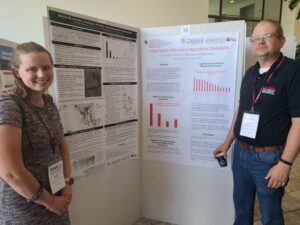
Before Elizabeth arrived in Copenhagen for the Congress, she participated in the pre-conference tour of farms, producers, businesses, and companies, throughout Sweden and Norway. The pre-conference tour was Ms. Thilmany’s first experience evaluating international agricultural markets and policies. Among the many things learned was the significant amount of support producers in Norway receive from the government for agriculture. Specifically, according to the OECD’s Annual Report: Agricultural Policy Monitoring and Evaluation 2020, the average Norwegian farmer receives 59% of their revenue from agricultural support measures. Of course, Norway’s current system of market price support has benefits and losses. Yet, one quote from a pig geneticist with Topigs Norsvin stood out: “when quantity is restricted, quality is everything.”
Show More At the end of the pre-conference tour, Ms. Thilmany was offered a spot on the “Next-Gen” program geared towards young farm managers. Skeptical initially due to her minimal farm management background, she took the opportunity to participate with twenty individuals from a dozen countries, ages 20 through 40, farming 30 hectares to over 10,000 hectares. During the program, Ms. Thilmany learned from a Swedish organic dairy case study and gained experience in completing a strategic analysis for the farm to promote the economic sustainability of the operation. In the end, Ms. Thilmany appreciated the connections built with peers in agriculture worldwide. Once in Copenhagen, Elizabeth and Paul presented two posters during the conference week. In addition, Mr. Goeringer presented information highlighting a 2019 survey of winter agronomy meeting attendees on the top legal issues they face in their operations. Meanwhile, Ms. Thilmany presented her ongoing work on the socio-economic implications of utility-scale solar development in Maryland. Amongst the diversity of attendees’ backgrounds and the opportunity to visit a dozen or so operations, underlying it all was mutual respect, endless questions, discussions to learn and challenge each other, and appreciation for each member’s contributions to the agricultural industry that we all have dedicated our time, energy, and talents to. Close
ALEI Hosts Russell Brinsfield Interns
By:Mariah Campbell, Sam Fairbanks, Nathan McMullen, and Alex Sadzewicz
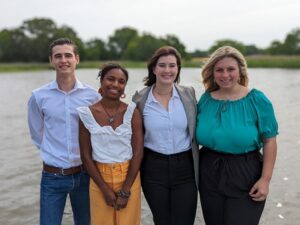
In partnership with the Harry R. Hughes Center for Agroecology, the Agriculture Law Education Initiative welcomed four interns for the sixth year of the Russell Brinsfield summer internship. The Brinsfield internship program is supported with funding from the University of Maryland Strategic Partnership: MPowering the State (MPower) is a collaboration between the state of Maryland’s two most powerful public research engines: the University of Maryland, Baltimore (UMB) and the University of Maryland, College Park (UMCP) — to strengthen and serve the state of Maryland and its citizens.
Show More Sam Fairbanks and Alex Sadzewicz are both rising second year law students at the University of Maryland Francis K. Carey School of Law, focused primarily on environmental and agricultural law. Before law school, Fairbanks studied geology and environmental management at James Madison University in Virginia. During her last two years of college, Fairbanks focused her studies on agricultural nutrient management and water quality in the Chesapeake Bay. Sadzewicz studied biology and chemistry at Butler University as an undergraduate. She has also worked in a variety of labs with projects related to agricultural and public health issues. Mariah Campbell and Nathan McMullen are undergraduate students at the University of Maryland at College Park studying Agricultural and Resource Economics. Campbell considers herself a horticulturist because she enjoys cultivating plants and fungi in her garden and wants to continue working with sustainable food systems in the future, hopefully on an international scale. In his career McMullen hopes to impact food security and access to nutrition, through policy, private sector, and public interest advocacy. Two major research projects the interns are working on this summer are building a sample urban agriculture lease, and researching the civil liability associated with school gardens supplying food for students. Working on the urban agriculture leasing project gave Campbell and Sadzewicz an opportunity to speak with various urban farmers and the Maryland Department of Agriculture (MDA) in order to address concerns of farmers in the sample lease, meet the requirements of MDA’s developing urban agriculture grant program, and address differences between different type of landowners. Sadzewicz said, “Connecting with farmers has given me the opportunity to see other stakeholder perspectives and the complexities within agricultural law and necessary considerations for their business. It has taught me that working with communities requires more sensitivity to all groups’ needs.” Fairbanks and McMullen have been researching ways to promote serving and distributing products grown in local school gardens. For the Brinsfield interns, learning about food safety regulations and the potential impacts of policy has been invaluable. “Our research into food safety liability for schools has been eye-opening to the complexities and gray areas of food safety regulations. This project has been exciting as it is an opportunity to impact access to nutrition and nutrition education in our communities.” McMullen said. The interns are also working on a variety of other projects this summer, including oyster aquaculture, agritourism zoning, regional farm leasing laws, value-added food regulations, and following the discussions on the upcoming Farm Bill. “The projects I have worked on this summer have given me more of a foundation in sustainability, not just for growing food, but also for farm businesses to continue to grow,” Campbell said. These projects have provided insight into the agricultural industry and its connection to the law. Fairbanks said, “This internship provided the opportunity to meet new people and learn about the many niches of agricultural law outside of nutrient management! I particularly enjoyed exploring how agritourism in Maryland is a sustainable opportunity to provide landowners with diversified income while keeping land in working agricultural condition.” Close
